You may see this classic Italian pasta on fancy restaurant menus, but Cacio e Pepe is deceptively simple to make. This traditional recipe requires only 3 ingredients: spaghetti, freshly ground black pepper, and real Pecorino Romano cheese!
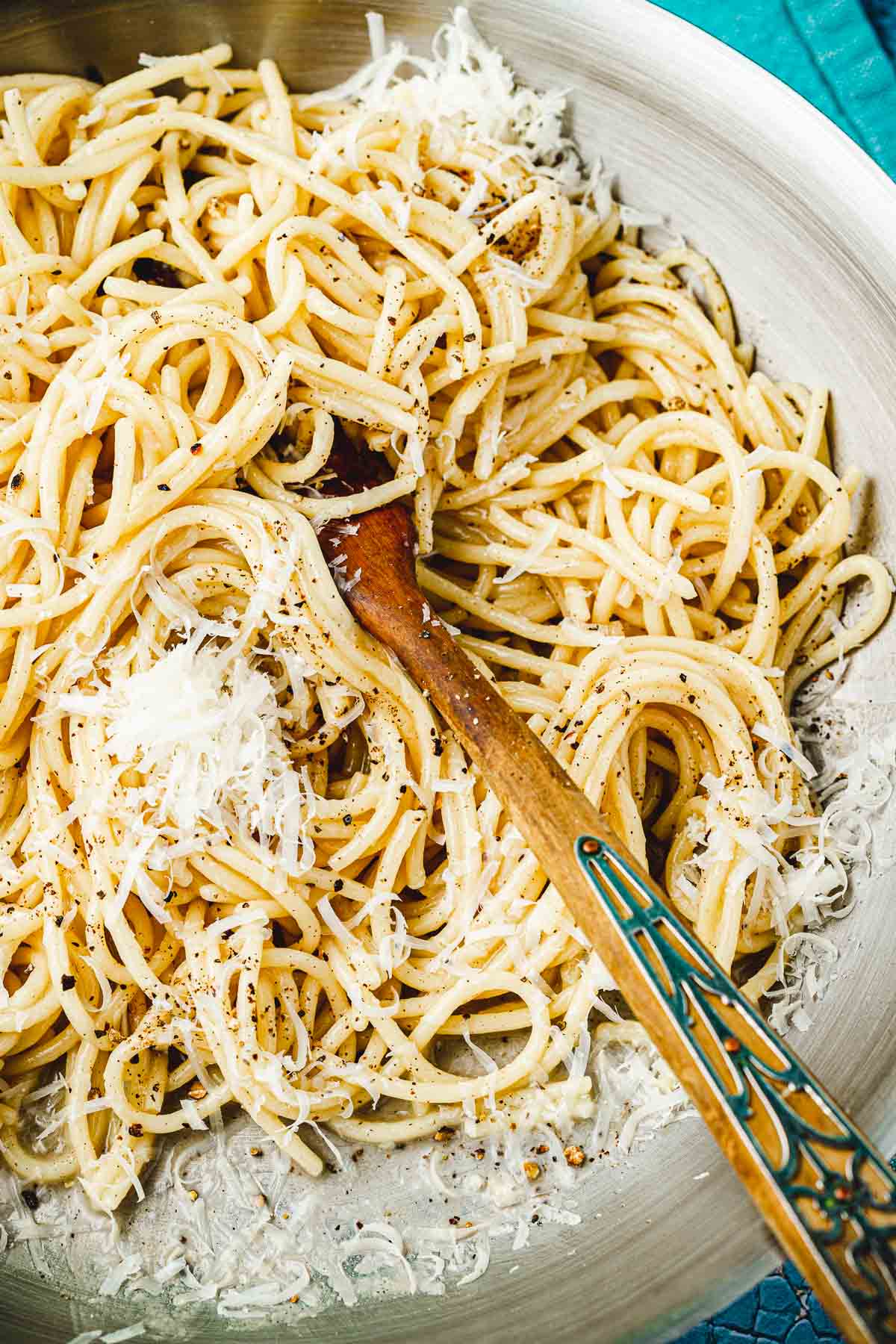
Cacio e Pepe has a reputation among home cooks for being difficult to make. I truly believe that with a good recipe, though, this Roman classic can absolutely be an easy weeknight dinner. I think the many who have reviewed and commented on this recipe would agree!
Cooks of my mother’s generation didn’t worry so much about creating the “perfect” creamy sauce for cacio e pepe. Like Pasta e Ceci and Pasta Pomodoro, it was a simple meal they could make with what they had on hand. They drained the noodles, added cheese and pepper, tossed to combine everything, and served.
I adopted that simplicity with this cacio e pepe recipe, while incorporating a few tips and tricks to ensure you get a deliciously creamy sauce every time with no heavy cream or butter necessary. It comes together quickly, and all you need to do to round out the meal is a simple salad, some nice bread, and perhaps a glass of wine. Easy!
Table of Contents
What is Cacio e Pepe?
Cacio e Pepe (pronounced: kaa-chee-oh ee peh-pay) is a popular Roman pasta of finely grated cheese, lots of freshly ground black pepper, and the pasta’s starchy cooking water. These three simple ingredients create a richly flavored emulsified sauce that beautifully coats the noodles.
The word cacio is Roman dialect for cheese, and pepe meaning pepper in Italian. It’s likely that cacio e pepe originated with the shepherds of the Roman countryside, who traveled with non-perishables as they moved around the hills and mountains with their grazing flocks.
By the mid-20th century, cacio e pepe had made its way into the city itself. It’s said that the owners of Rome’s osterie liked serving cacio e pepe because the salty cheese and copious pepper prompted diners to order wine to wash it down—a clever business ploy!
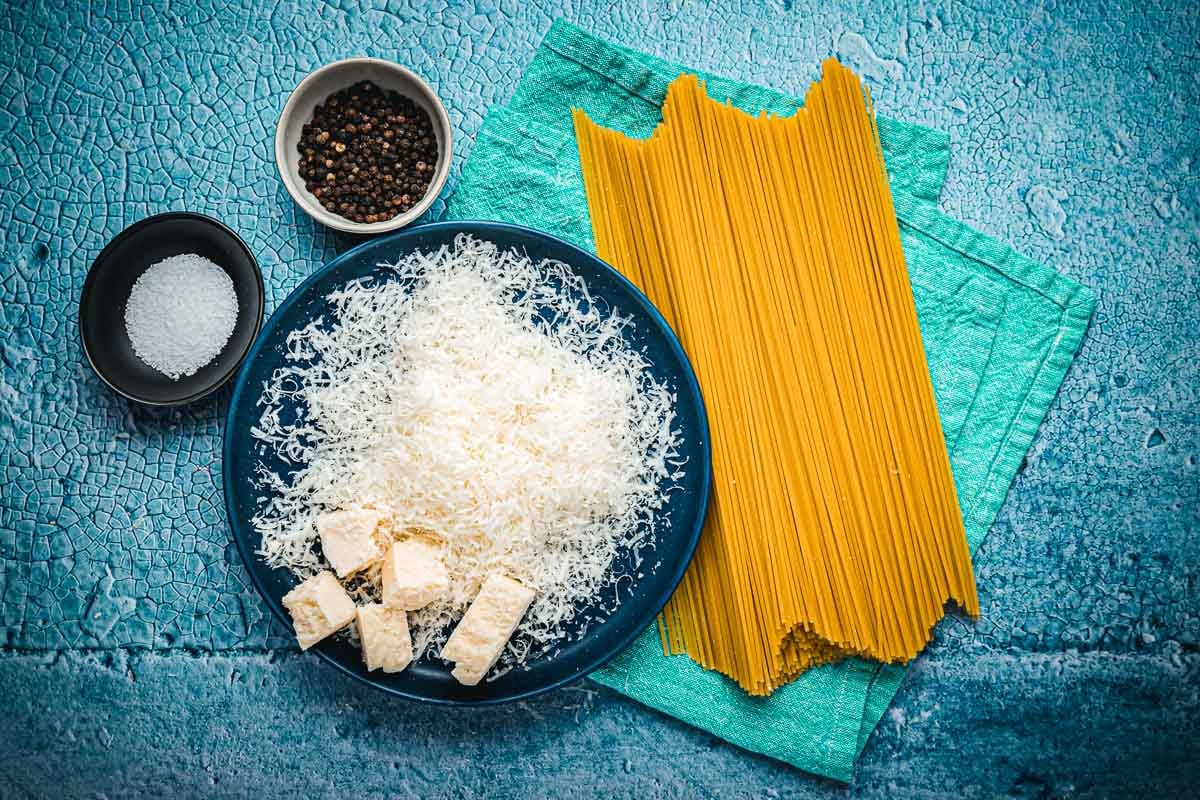
What is in Cacio e Pepe?
You only need a few pantry ingredients to make cacio e pepe:
- Pecorino Romano cheese: Has a crumbly texture that makes it good for grating. Avoid the temptation of buying pre-shredded cheese. It’s too thick and won’t melt quickly enough to create the creamy sauce you’re after. I recommend using a microplane and grating it yourself so it’s light and fluffy.
- Black pepper: To get the most flavor, start with whole black peppercorns. Grind them yourself, either with a mortar and pestle or a spice grinder.
- Pasta: Spaghetti is the traditional pasta for cacio e pepe, but even Roman establishments now use popular shapes such as rigatoni, bucatini, and thick, square-cut noodles called tonnarelli. Use a good quality brand that cooks evenly and retains its al dente bite.
- Salt: Cooking the pasta in salted water ensures it’s nicely seasoned.
How to Make Cacio e Pepe
Making a creamy sauce that coats the noodles takes a bit of elbow grease and vigorous stirring, but once you’ve done it a couple of times it becomes easy.
- Put a pot of water on to boil. Fill a large pot with just enough water to submerge the pasta. Use a little less water than you normally would so the water will be extra starchy as the pasta cooks. When the water comes to a boil, add 2 teaspoons salt and the pasta. Boil until al dente according to the package instructions.
- Meanwhile, grate the cheese. While the pasta boils, use a microplane or the small ‘star’ holes of a box grater to finely grate 4 ounces Pecorino Romano cheese. You’ll need about 3 very loosely filled cups.
- Toast and grind the pepper. Place 1 tablespoon whole peppercorns in a small non-stick skillet and set it on medium-high heat. Toast, shaking the pan often, until they release their fragrance, 2 to 3 minutes. Let the peppercorns cool slightly, then process them in a spice grinder or a mortar until coarsely ground.
- Reserve 1 1/2 cups of starchy pasta water, then drain the pasta. Return the pasta to the pot and pour in about 1/3 cup of the reserved water. Return the pasta to the stove but don’t turn on the heat.
- Make the cacio e pepe sauce. Sprinkle 2 teaspoons of pepper and a handful of pecorino into the pot followed by another splash of hot pasta water and immediately begin stirring as vigorously as you can to mix the cheese with the noodles and water. Add another splash of water and another handful of cheese and stir, stir, stir to create a creamy sauce. Elbow grease is the key here to prevent the cheese from clumping. Add one more, small handful of cheese—reserve a little for garnish—and a final splash of hot water.
- Finish and serve. Stir until everything is nicely combined and the noodles are well coated. Transfer the pasta to bowls, garnish each serving with a sprinkle of pepper and pecorino cheese and serve immediately, while still hot.
Tips and Tricks for this Cacio e Pepe Recipe
To ensure your cacio e pepe sauce turns out glossy and flavorful every time:
- Grate the pecorino as finely as possible. The grated cheese should be light and airy, not densely packed. A microplane is the best tool for this job.
- Freshly ground pepper is important. Pounding gives you a mix of coarsely and finely ground pepper, an ideal combination in my opinion. Whatever you do, don’t use pre-ground pepper, as it won’t be nearly as fragrant or potent.
- Find your favorite mixing method. I like to mix cheese, pasta water, and noodles in the pot and stir as if my life depends on it. But some cooks prefer to make a paste of cheese and pasta water and then mix everything in a large bowl. To do the paste method:
- Combine 2/3 of the grated pecorino with the pepper and enough hot pasta water to create a paste. Whisk to work out any lumps, adding more water to help melt and dissolve the cheese.
- Using a pasta server or tongs, transfer the noodles from the pot straight to the bowl and stir vigorously to coat the noodles. Add more pasta water from the pot as needed to make a creamy sauce.
- Note: I’ve found this method to be extra messy, as bits of cheese and drops of sauce tend to fly out of the bowl.
- Don’t dawdle. No matter how creamy you manage to get your sauce, it will stiffen as it cools. Eat it while it’s hot!
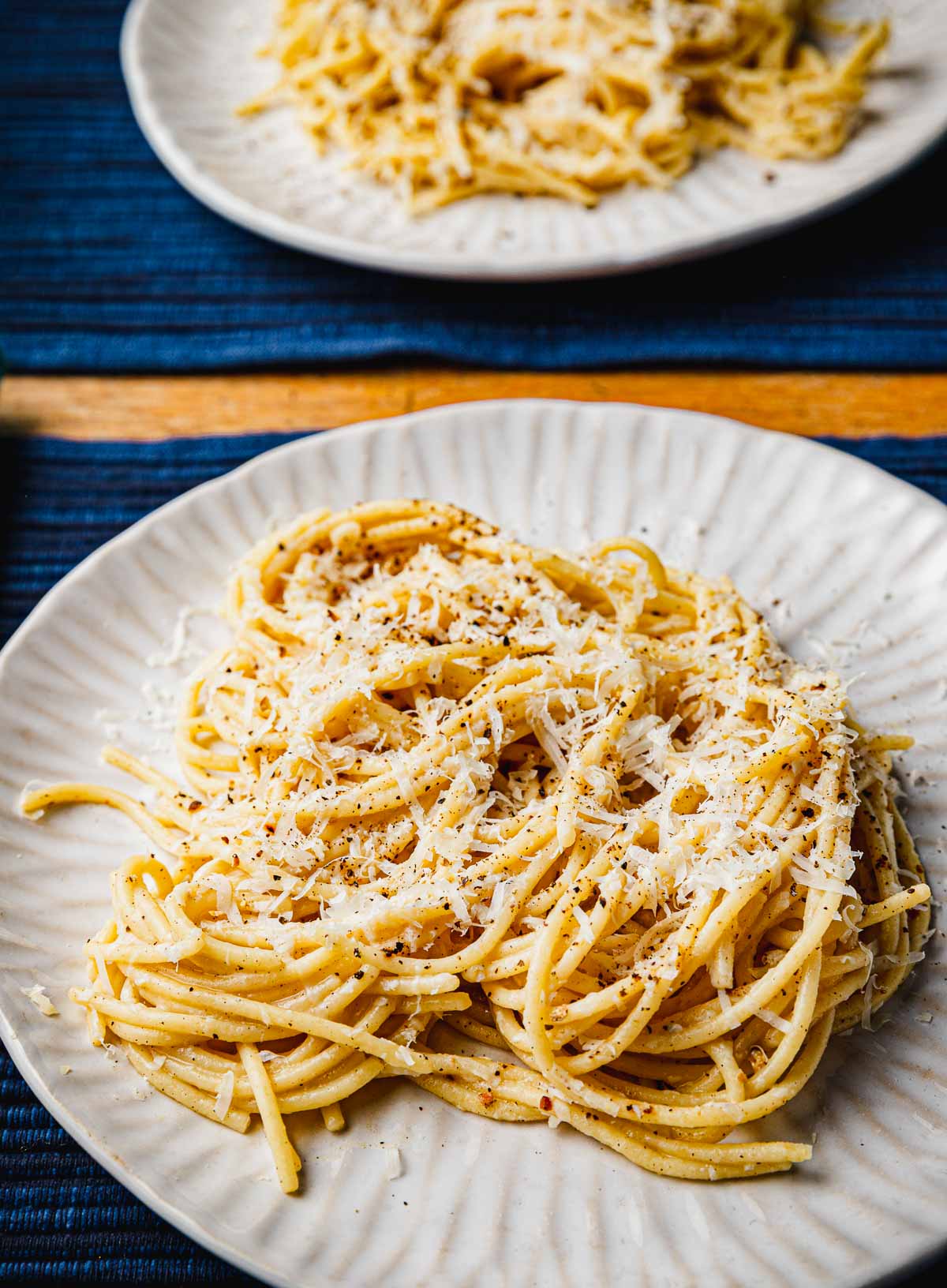
What to Serve with Cacio e Pepe
Cacio e pepe may be simple, but it’s rich. If you’re serving it as the main course, you can round it out with a salad, simply dressed with good Italian olive oil and wine vinegar. Or for a twist on the classic, serve with scampi-style shrimp, as with my Shrimp Cacio e Pepe recipe.
Cacio e pepe also makes a good primo piatto (first course), served in smaller portions. It goes especially well with vegetarian mains, such as stuffed peppers or zucchini. To drink, try a white wine with good acidity, such as Verdicchio or Vermentino. Or, if you prefer red, something on the lighter side, like Pinot Nero.
More Classic Italian Pasta Recipes
Browse all Mediterranean recipes.
Visit Our Shop.
Cacio e Pepe
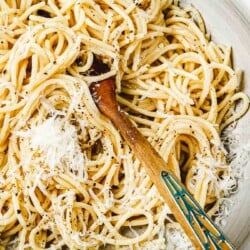
Ingredients
- 2 teaspoons kosher salt
- 1 pound spaghetti, tonnarelli or bucatini pasta
- 4 ounces Pecorino Romano cheese, finely grated
- 1 tablespoon whole peppercorns
Instructions
- Salt the water: Fill a large pot with just enough water to submerge the pasta. Use a little less water than you normally would so the water will be extra starchy as the pasta cooks.
- Boil the pasta: Add the pasta to the boiling water, reduce heat to medium high and cook according to package instructions until the pasta al dente.
- Grate the cheese: While the pasta is cooking, grate the cheese with a microplane or on the small star holes of a box grater. You should have about 3 cups of very fluffy cheese.
- Toast and grind the peppercorns: In a small skillet set over medium-high heat, add the peppercorns. Toast, stirring occasionally or just until they release their aroma. Cool slightly, then transfer them to a mortar or a spice grinder. Pound or grind the peppercorns to a mostly coarse grind with some finer specks but no large pieces.
- Drain and reserve pasta water: When the pasta is done, set a colander over a bowl, and drain the pasta. You want to reserve 1 1/2 cups of the boiling pasta water in a heat-proof measuring cup or bowl.
- Make the sauce: Do this part quickly! Return the pasta to the cooking pot and add 1/3 cup reserved pasta water. Set the pot on the burner but don’t turn the burner on. Sprinkle about 1/3 of the cheese, 2 teaspoons pepper, and a splash of the reserved pasta water. Use tongs or a pasta spork to stir vigorously to combine the ingredients. Add another splash of reserved pasta water and another 1/3 of the cheese and continue to stir to coat the noodles evenly. The sauce should look smooth and creamy. Add more cooking water, a splash at a time (if necessary) to loosen the sauce. You may not use all of the pasta water.
- Serve: Transfer the pasta to individual bowls. Top each serving with a spoonful of reserved pecorino and a pinch of pepper and serve.
Video
Notes
- Shop this recipe: Visit our shop to browse quality Mediterranean ingredients, including the pasta used in this recipe.
- For the paste method:
- Combine 2/3 of the grated cheese with the pepper and enough hot pasta water to create a paste. Whisk to work out any lumps, adding more water to help melt and dissolve the cheese.
- Using a pasta server or tongs, transfer the noodles from the pot straight to the bowl and stir vigorously to coat the noodles. Add more pasta water from the pot as needed to make a creamy sauce.
- What to do with leftovers: Leftover cacio e pepe makes an excellent spaghetti frittata! Mix the leftover pasta with beaten egg, then cook in an oiled cast iron skillet until browned on the bottom. Pass it under the broiler for a couple of minutes to finish cooking and brown the top.
Nutrition
Premium Italian Pasta Bundle
Featuring four classic pasta shapes—Rigatoni, Penne Rigate, Fusilli, and Spaghetti—crafted with 100% Italian durum wheat semolina for the perfect bite every time.
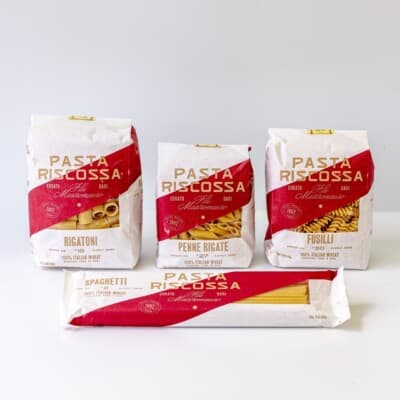
*This post has recently been updated with new information for the readers’ benefit.
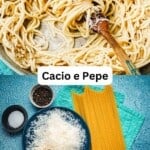
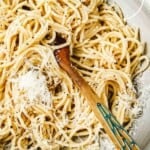
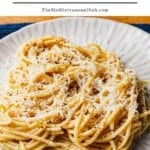
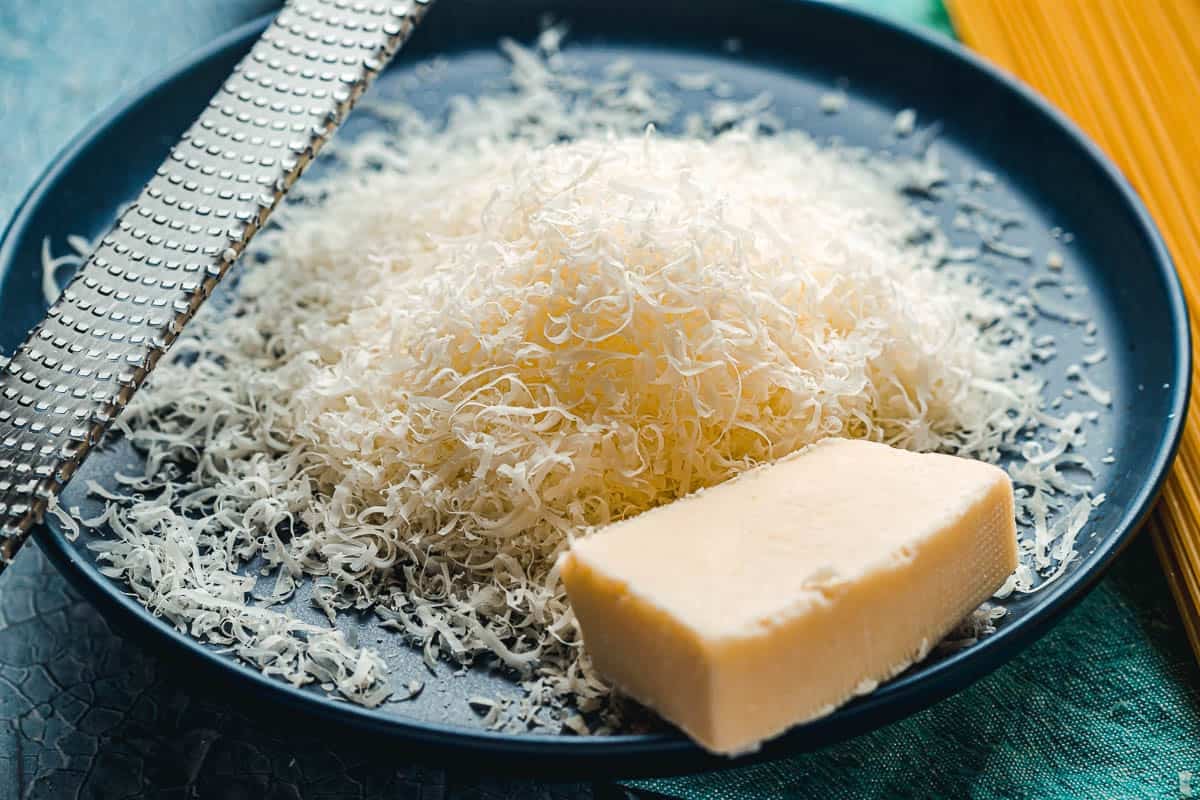
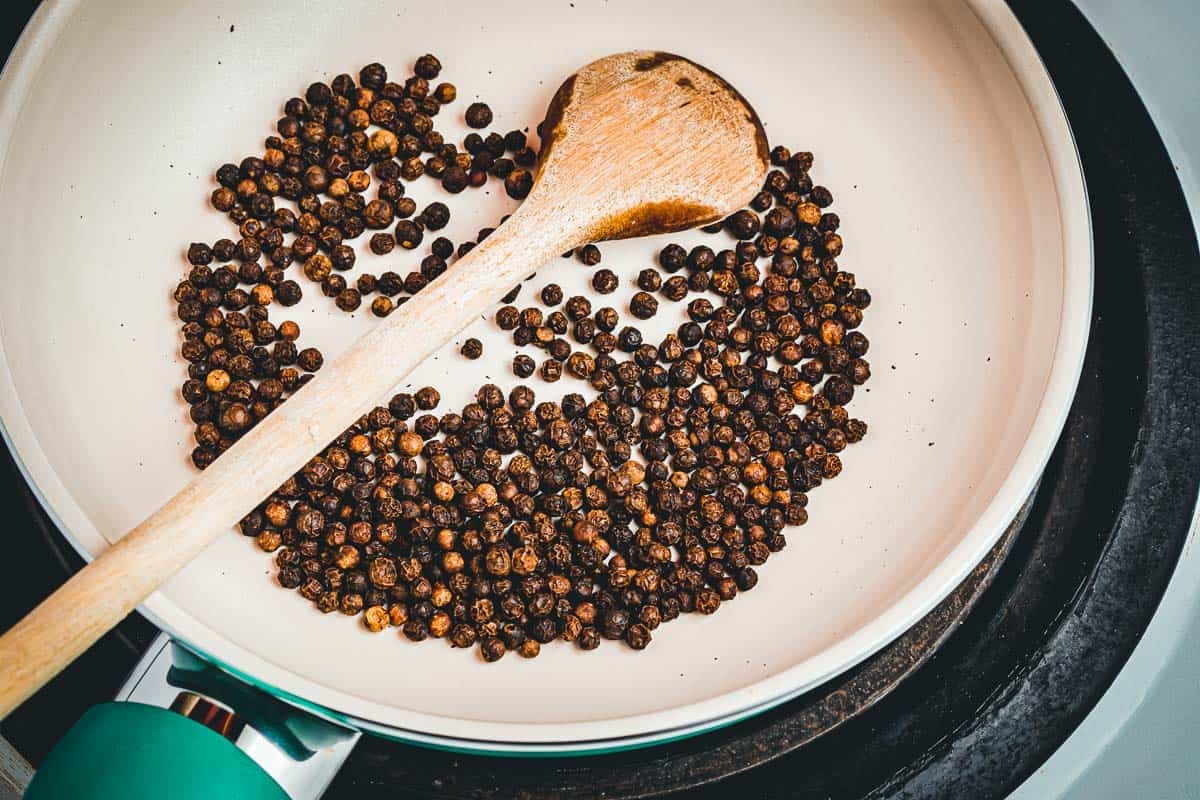
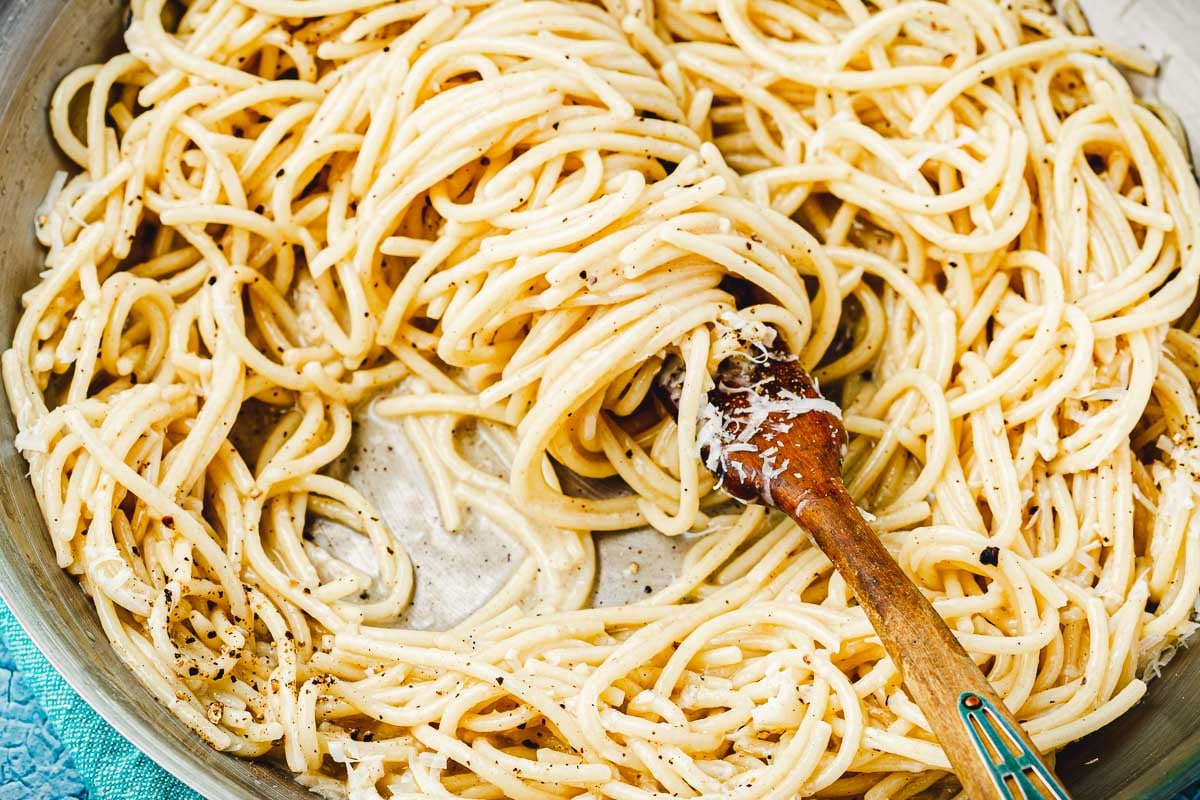
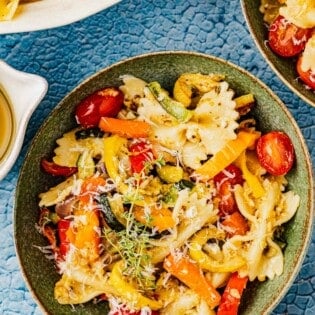
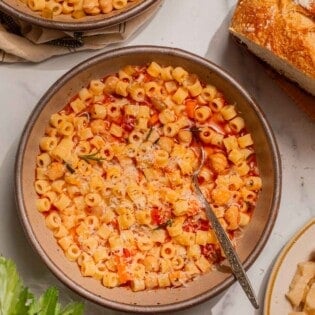
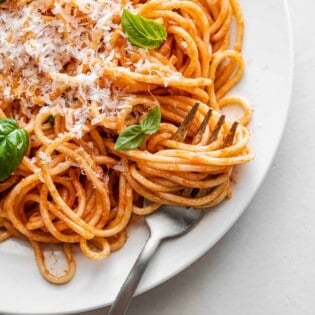
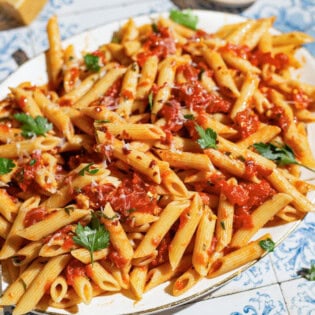
this came out amazing and brought back memories of our trip to Italy! The flavor is perfect!
Awww! That’s wonderful! So glad you enjoyed it!
Side note if you have issues getting the cheese to blend correctly…blend it in a blender with the pasta water and it turns out perfect then throw on pasta
Thanks for the tip, Amanda!
Easy and delicious!
Great recipe. Easy to make and turned out perfectly. Delicious!
Loved it! Simple and delicious! Will make again and again
Ack – ended up way too peppery! I’m gonna have to try again another night.
Excellente
Just made this recipe and used fresh pasta. Followed the directions closely and WOW! Heating the peppercorns really changed the flavor for the better!! Highly recommend
Thanks so much, Richard!
Really nice thanks, I made a stock tho – toasted cracked peppercorn and bayleaf. Mixed half and half with pasta water, came out spicy, silky and good!
I made this for dinner tonight and it was a hit!! This is so delicious and super easy to make… Will make again and again.
Yay! Thanks, Maria!
This was delish! Are the nutritional facts per serving? Do you know how big each serving is? Thanks!
Hi, Kerrianne. Yes, the nutritional facts are per serving. This particular recipe can be divided by 6 to get the approximate “serving size”. The nutrition info here is our best effort and we use a program that calculates that for us based on the ingredient list. The exact serving size measurement (by grams, cups, etc) is another layer that’s harder for us to precisely calculate at the moment, but we’re working on it!
Delish!
This changed my life, girlfriend suggested it and she got the same, was so creamy, I didn’t believe when she said how was made, was so busy eating mine and rest of hers I forgot to say had run in pantyhose lol. Amazing dish
Thanks so much ~ really glad to hear it was a hit!
Yummy
This was awesome!!!!! We are going to try the leftovers with eggs tomorrow.
Belated thanks, April!
dd sume anchovy and my Uncle Aldo might rise from the grave to eat it!